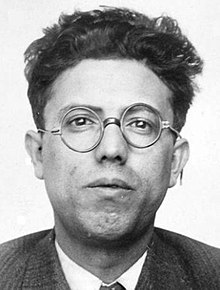Mihail Roller | |
|---|---|
 Roller's mug shot, 1933 | |
| Born | 6 May 1908 |
| Died | 21 June 1958 (aged 50) |
| Other names | Mihai Roller, Mihail Rolea, Mihail Rollea |
| Academic background | |
| Influences | Friedrich Engels, Vladimir Lenin, Karl Marx, Joseph Stalin, Andrei Zhdanov |
| Academic work | |
| Era | 20th century |
| School or tradition | Marxism–Leninism, Zhdanov Doctrine |
| Main interests | Marxist historiography, history of Romania, oral history |
| Notable works | Pagini ignorate din istoria României moderne (1945) Pedagogia în URSS (1947) Istoria R.P.R. (1947 etc.) Anul revoluționar 1848 (1948) |
| Resting place | Cenușa Crematorium, Bucharest |
Mihail Roller (Romanian pronunciation: [mihaˈil ˈrolər], first name also Mihai, also known as Rolea or Rollea;[1] 6 May 1908 – 21 June 1958) was a Romanian communist activist, historian and propagandist, who held a rigid ideological control over Romanian historiography and culture in the early years of the communist regime. During his training in engineering, he rallied with the communist cells in Romania and abroad, joining the Romanian Communist Party while it was still an underground group. He collaborated with the Agitprop leaders Leonte Răutu and Iosif Chișinevschi, spent time in prison for his communist activity, and ultimately exiled himself to the Soviet Union, where he trained in Marxist historiography.
Returning to Romania upon the close of World War II, Roller carried out communist assignments in the field of culture. Under Răutu, he helped draft the official history textbook, monopolizing the historical narrative for over a decade. Turning the focus away from nationality and on class struggle, Roller's work sought to reeducate the traditionalist public, and depicted Romania as strongly linked to Slavic Europe. In advancing such theses, Roller censored out historical events, and, in one instance, recounted events that never took place in real life.
In the later 1950s, Roller found himself shut out by his communist peers. He was branded a deviationist by the party leadership members, probably because he had unwittingly exposed their secondary roles in early communist history. Roller died in mysterious circumstances, which do not exclude the possibility of suicide.
- ^ (in Romanian) Mihai Stoian, "Mihail Roller între 'nemuritorii' de ieri și de azi", România Literară, 32/1999
© MMXXIII Rich X Search. We shall prevail. All rights reserved. Rich X Search
